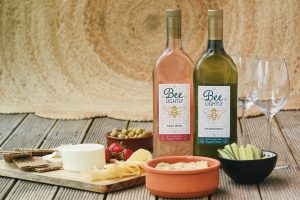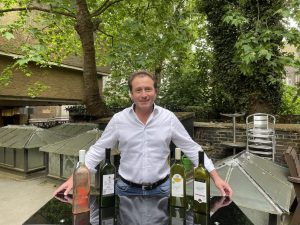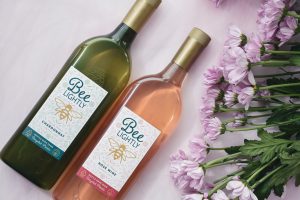Packamama, a climate tech packaging firm, continues to gain traction with its novel, eco-friendly approach in the conservative wine sector.
Albertsons Companies Inc. in late September became the first company in the U.S. market to launch a line of wines packaged in Packamama’s flat-pack bottles made out of 100 percent recycled polyethylene terephthalate (rPET) resin. In doing so they became the latest in a line of marketers –– up to now, mostly in Europe and Australia –– to adopt this new packaging design.
And now, according to a Packamama spokesman, the company’s “next strategic initiative for market expansion focuses on launching production within the U.S. and the South African market, in line with our commitment to sustainability and innovation in the wine industry.”
Currently, Berry Global Group blow molds Packamama’s rPET bottles in Europe and Visy Industries produces its bottles in Australia. The wines now being sold by Albertsons in the U.S. were packaged into the rPET bottles in the U.K.
Packamama, he continued, is weighing how best to serve the U.S. wine industry. “This includes options from Berry Global but is not limited just to them,” he said, noting that since large-volume wine production is centered on Northern California, Packamama is seeking manufacturing partners who are ideally located in this area.
A Range of User and Eco-benefits
Albertsons’ new Bee Lightly line of French chardonnay and rosé wines is the latest addition to the Boise, Idaho-based company’s Own Brands wine portfolio. Distinguished by Packamama’s signature flat bottle design, each bottle holds the standard volume of 75 cl of wine that consumers expect, but in a shatterproof package that, at just 63 grams, is 87% lighter than traditional glass bottles.

Albertsons has chosen to package its new Bee Lightly French wines in Packamama’s flat-pack, recycled PET bottles.
The flat-pack bottle design features a low center of gravity, prominent lip and 5.5-degree tip angle that allows even an empty bottle to remain stable. “The tip angle,” notes Packamama, “is the same as the Leaning Tower of Pisa, which, as we all know, is still standing.”
These transparent, food-safe, BPA-free, plastic bottles also offer a wine shelf life of 19 to 21 months, and all but eliminate losses from breakage, according to Packamama.
Additionally, the fully recyclable bottles offer a smaller environmental footprint compared to conventional wine bottle shapes by reducing transportation-related emissions. “The unique flat-pack shape,” says Packamama founder and CEO Santiago Navarro, “also enhances logistic efficiency, enabling the transportation of nearly twice as many products on a single pallet.”

Packamama founder and CEO Santiago Navarro
Albertsons –– which operates more than 2,200 retail food and drug stores –– confirms that Bee Lightly packaged in this bottle uses 44 percent fewer pallets for shipping compared to standard glass bottles. It says its adoption of this design “underscores a commitment to recycled packaging solutions without compromising on the quality and flavor of wine that customers expect.” In addition to partnering with Packamama, the grocery giant also worked on this project with WX Brands, which is known for creating wine brands for global retailers.
Discover Prospector Premium, learn more here!
“At Albertsons Cos., we are continuously looking for ways to distinguish ourselves within the wine sector and to expand our diverse selection of quality wines for our customers,” said Curtis Mann, Master of Wines at Albertsons Cos. “By launching our new Bee Lightly selection, we are offering shoppers quality, affordable wines from France while also redefining wine packaging standards.”
He notes that The Tasting Panel magazine awarded both the 2022 Bee Lightly vintage chardonnay and the 2023 rosé 91 points, which is deemed to be “outstanding” or “excellent.”
Packamama’s Back Story
Navarro first launched his company in the UK in 2018 as Garçon Wines. The goal was for that firm to provide a vehicle for introducing his first eco-flat rPET bottles. But after getting significant interest in the package from several large wine industry companies, he decided to pivot his strategy and leave the very competitive wine-supply business to others. In March 2022 Navarro opted to focus solely on the bottle and rebranded the firm’s packaging operations as Packamama –– named after the revered Inca goddess Pachamama, given that their goal was to produce packaging that helps to protect Mother Earth.

These rPET bottles are 87 percent lighter than comparable glass bottles, are shatterproof, recyclable, and significantly reduce transportation-related greenhouse gas emissions.
Packamama cites independent research noting that glass bottles are “the single largest contributor to a wine’s carbon footprint because of their weight in transport and the energy required to produce, move, and recycle them.” Simply lightweighting a glass bottle, it adds, doesn’t offer the same reduction in CO2 emissions as shifting to a recycled PET bottle.
On its website, Packamama declares: “If we’re honest, the wine bottle as it’s known has been around too long and is no longer fit for purpose. So we reinvented it, creating a better shape from a better material, so it’s better for the planet. And your business.”
In addition to appealing to eco-conscious consumers, Packamama urges wine brands and retailers to adopt its flat-pack rPET bottles to “unlock new sales channels, such as where space and weight are at a premium or glass packaging has to be avoided.” Additionally, it notes, since the wine industry is more affected than others by climate change, it urges its players to “do your part to help safeguard the industry’s future.”
The views, opinions and technical analyses presented here are those of the author or advertiser, and are not necessarily those of ULProspector.com or UL Solutions. The appearance of this content in the UL Prospector Knowledge Center does not constitute an endorsement by UL Solutions or its affiliates.
All content is subject to copyright and may not be reproduced without prior authorization from UL Solutions or the content author.
The content has been made available for informational and educational purposes only. While the editors of this site may verify the accuracy of its content from time to time, we assume no responsibility for errors made by the author, editorial staff or any other contributor.
UL Solutions does not make any representations or warranties with respect to the accuracy, applicability, fitness or completeness of the content. UL Solutions does not warrant the performance, effectiveness or applicability of sites listed or linked to in any content.
